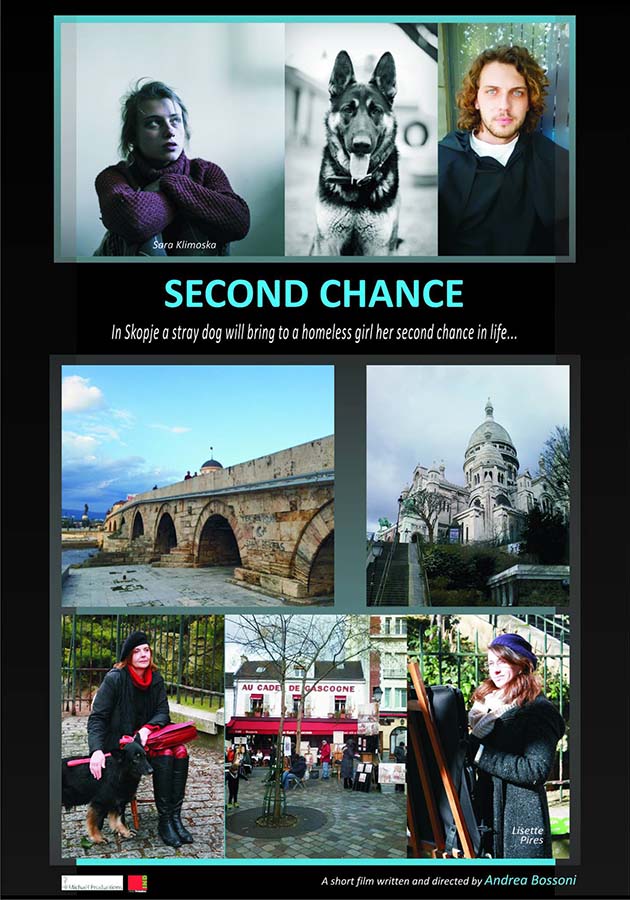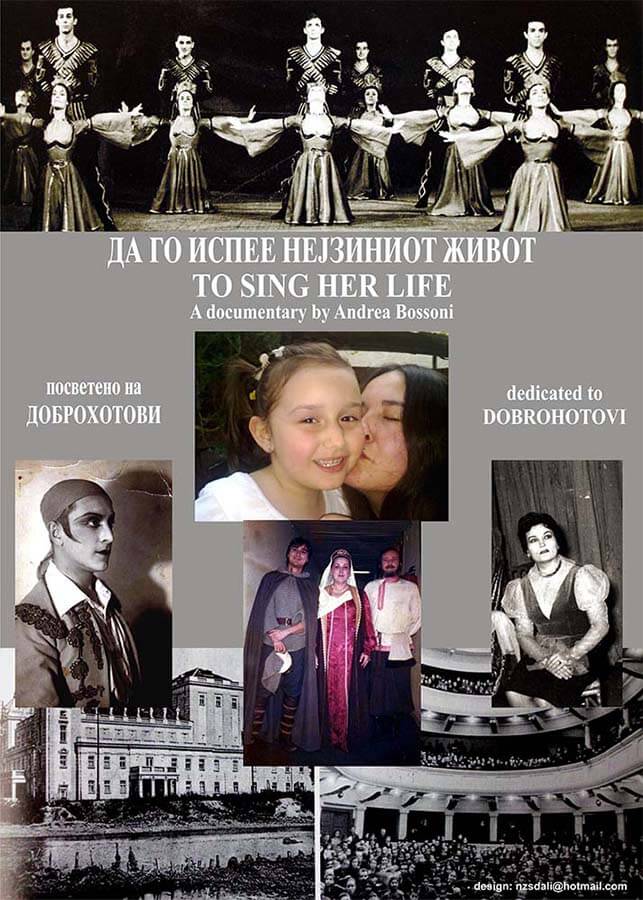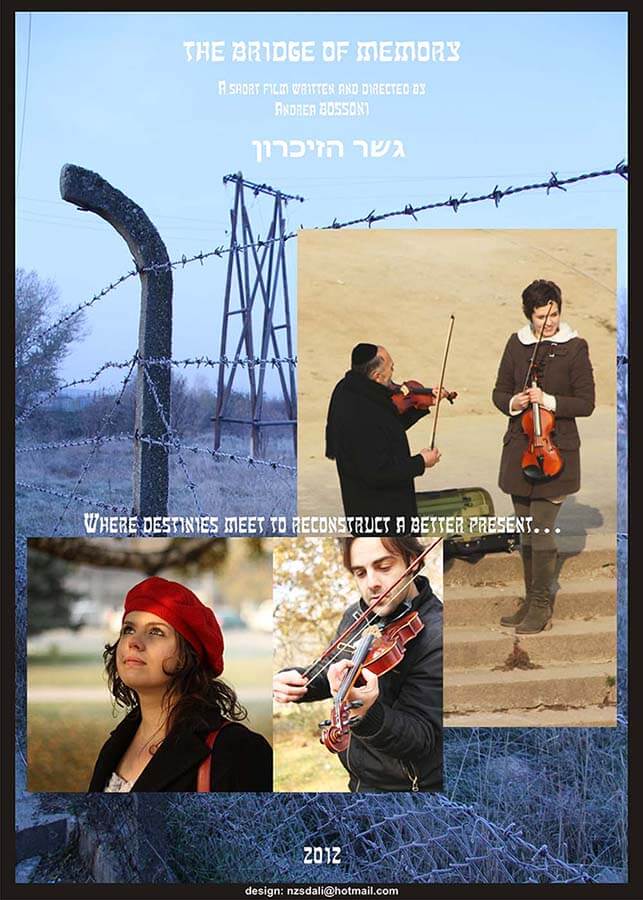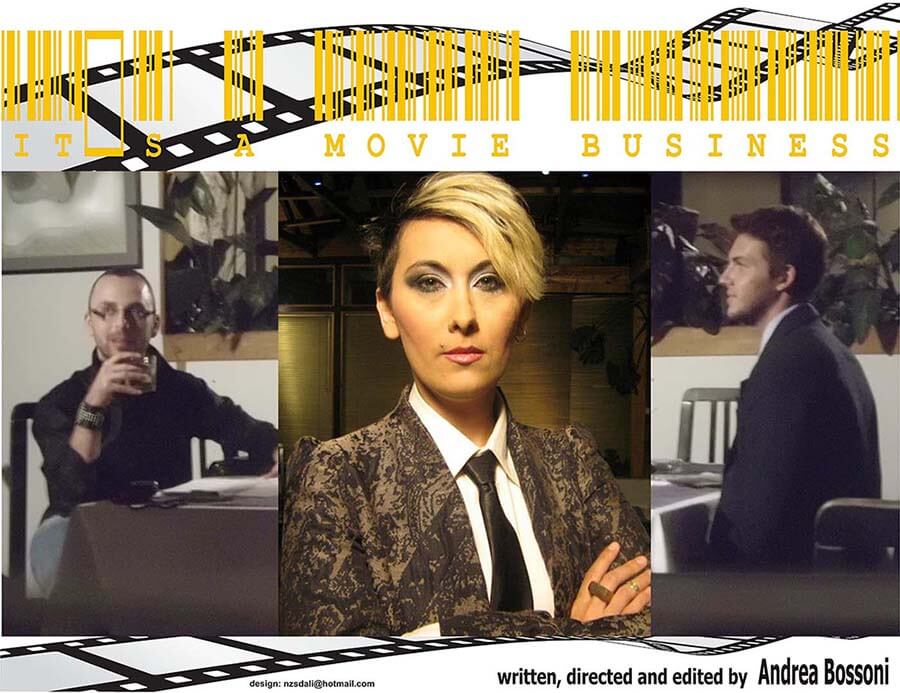About My Films
About my professional path through the years I wrote, directed, often edited, and almost always produced all my film and documentary works, nine so far.
They are mostly fictional short films, while the documentary is a biopic, and they are all echoing the main topics I am interested in: journeys, meetings, deep changes from which we all evolve and transform.
These stories portray through my vision and my unconventional style the lives, the journeys, the encounters with a major change visually narrated in every complex facet giving power, strength and inspiration to an international “brand” of intercultural projects many times shot in different countries and spoken in different languages as in the case of “Second Chance”.
I started being a scriptwriter in 1995 and a film director in 2002. My first short film, “Ricordi Metropolitani” (“Urban Recollections”), was very much appreciated for its originality and visual language (I have been working with deaf people for almost seven years).
My world as vision and perception is subtle, particular, unique.
My intelligence, depth, sharpness, and sensitivity too.
Stay In Touch
Hire me: I am available for professional collaboration and consulting.
(FRANCE / MACEDONIA, 2016 - 2017)

Original version in French and Macedonian with English subtitles
The short film has been awarded in three international film festivals and selected in official competition in twelve international film festivals along the second part of 2017.
“Second Chance” is based on an original subject and it was conceived for a short film of fiction.
The subject was born in 2011, then the story was published as a short fictional story (narrative) in Italy within a collection of literary works written by young talented writers in 2013
Having lived in Skopje for almost eight years gave me the opportunity to understand the depth of the spirit of the Macedonian people, able to adapt to many hard situations and whose courage and humanity have been proven in many contexts.
Not only I lived, worked, and studied in Skopje, but I had a lot of meetings and experiences that enriched me as a person and artist.
With gratitude and respect for the Macedonians I met, “Second Chance” has become the natural consequence of deep love.
The mystical aspect of this country linked to the humanity of people gave birth to this story of courage, love, and hope.
According to the contents of the short film, the audience to which it is addressed is the most varied possible in terms of social and cultural level as well as age group. The genre of the short film belongs to that of social themed ones. It is a very intense and emotional story that brings a positive message of hope.
In this context, emotions tell the human journey and the evolution of the protagonists through the change. In a social context in which people from different social classes are mixed, life in the street becomes a mirror of a condition from which one can learn how to live in dignity and decency.
The young woman represents the archetype of those people who were less fortunate than others and whose luck brings them a gift one day.
In a style that can recall Chaplin’s masterpieces (two in particular, “City Lights” and “Limelight”) for the poetry that makes the story so touching and the purity of the protagonist’s feelings and intentions, poverty is appeased by the hope that things can change at any time.
The curiosity of this short film is that in the first sequence of Skopje, we have the dog’s point of view on the Macedonian reality and we see what the dog sees with the colour spectrum that dogs have (well worked in post-production by first doing research about dog’s vision).
Hope, courage, and the power of change are three of the most important elements that characterise this story and motivate characters to move forward in their lives.
For me, it was a beautiful human and artistic adventure, a rewarding one, and the most fulfilling so far.
Rachel, a French Jewish young woman artist in Paris, is very close to Nena, her cousin, a Macedonian Jewish young woman from Skopje who lived on the street. A letter from Nena to her cousin in Paris creates an invisible thread that will unite their lives and will strengthen their bond.
In Skopje, Goran, a young Catholic priest gambles and drinks, a small family of homeless people tries to survive in the best possible way just like the young woman who is also in misery, but who tries to survive with honesty while keeping her dignity and integrity intact.
The young priest lives a frustrating condition, he drinks and gambles, but after all, he is a human being with his limits like everyone, no matter the appearance.
On the contrary, Nena is very calm inside although her life is hard and most of the people who pass by her do not see her, like if she was invisible.
The courage to stand up after many very hard moments and the spontaneous and deep friendship with Miki, the stray dog, will allow Nena to seize her chance and change her destiny.
SECOND CHANCE won three international film festival awards and it was officially selected in twelve international film festivals along the second half of 2017.
There are seven versions of the trailer in seven languages and six versions of the short film and the film playbill in six languages, including Chinese, Hebrew and Japanese.
Thanks to NSAEN Online Film Festival award in 2017 I got a worldwide distribution deal by Shami Media Group and now “Second Chance” is also available for purchase on Amazon USA and UK through Prime.
(MACEDONIA, 2011 - 2012)
Aleksandra “Sasha” Dobrohotova is a Macedonian young talented student.
Twenty-nine years old, a great talent, a hard working professional focused on her goal: becoming a great Opera singer like her mother and her grandmother.
Her Russian origins lead her to follow her family path in the Opera singing.
Since she was a child, she dreamed to make of the singing and the music her life.
This is her story through her family’s recollections between a glorious past and a challenging present.

Original version in Macedonian with English subtitles.
Link not available as it is not online.
Five parts more like five dominant issues divided into chapters form the documentary narrative structure:
CHAPTER 1. Sasha at home.
This part introduces Sasha’s intimacy, her memories while she gets back to her family’s past and recollects many anecdocts for the viewers.
This is the part (and chapter) about Sasha’s origins, her family, her vision of life, her passion, her personality rather complex.
CHAPTER 2. Music Academy:
The academy… in other words a lot of work and passion.
Here we enter in the professional aspect of Sasha’s life: we approach her during her engaging classes at the music academy of Skopje; we discover how she works, the relation with some of her professors, her techniques in singing, etc.
CHAPTER 3. Kafe Galerija 8:
Social life and friends (how Sasha lives life through the relation with her friends and the people she cares for).
Sasha’s special bounds with some of her colleagues who are also close friends.
CHAPTER 4. Macedonian Opera and Ballet:
- INSTITUTIONAL MOMENT ABOUT THE OPERA SINGING AND DANCING
- TWO INTERVIEWS (TO TOMISLAV SOPOV AND EKREM HUSEIN)
- RELATION BETWEEN PAST AND PRESENT THROUGH THE INTERVIEWS OF TWO PEOPLE WHO KNEW ALEKSANDAR DOBROHOTOV.
Interviews with a Macedonian orchestra conductor and one of Aleksandar Dobrohotov’s students.
From their memories and involvement we’ll dig into the personal stories of these two men to reconstruct the uprising of the Macedonian ballet with a particular attention on Aleksandra’s grandfather works along the years who was one of the most brilliant ballet dancers and who later opened his ballet dancing school.
CHAPTER 5. Sasha and Puccini.
A fifth point of ideal chapter connects Sasha to her favorite Operas by Puccini. Which are the things in common and the differences between these women and their stories and the affinities if there are some.
Some material from the Macedonian Opera and Ballet Theater at the beginning of its foundation and the shooting of two gala evenings in Skopje during which the students were performing and showing their singing skills will enrich the visual narration of an uncommon life.

(Macedonia, Digital Camera, PAL, Sub En, colour, 14′ 18″, 2012)
After losing his beloved wife Sara, a talented theatrical singer, Professor Jakov Avramovski has lost a part of his memory.
Music is the bridge between past and present, two different physical and spiritual times and places.
In his past, Jakov used to play the violin for surviving the horrors of the camps. In his present the sound revives his many moments of happiness with Sara who is still somehow alive through their deep shared passion.
Jakov is trapped in a sort of passive wandering in search of a meaning to give to his loss till the day in which he meets Irena, one of his former music students.
After exchanging a look and few words, Irena’s presence brings Professor Avramovski back to reality. Loss connects their lives: when Irena was Professor Avramovski’s student her father was very sick, so music helped her to overcome her father’s death.
Accepting things as they are seems to be for Jakov the only way to break his loneliness and to give himself a chance to celebrate life and love beyond the limits of human existence.
My grandparents and father were Ashkenazy Jews, my grandparents were from Paris (Lehmann), France while my father was born in Auschwitz, Poland, in 1944.
This short film is dedicated to the beloved memory of my grandparents and father.

(Macedonia, Digital Camera, PAL, Sub En, colour, 29′ 16″, 2012)
Jeremy Abrahams is an independent American scriptwriter and movie director living in Skopje.
One day Jeremy receives a calling from Aleksandar Donevski, a Macedonian film company production coordinator working for a small Skopje-based film company, and he proposes to meet each other. Aleksandar Donevski is managing the hiring of the crew with the supervision of Mr. Zoran Mihailovski, the production manager and Miss Aleksandra Mitevska, the film producer and owner of the small film company. Donevski informs with daily calls the production manager and the film producer about the developments of meetings and contracts. That evening Jeremy meets Aleksandar Donevski who submits him a script option purchase agreement to buy his script with the acquisition of the rights as a production company.
Jeremy talks for a while about some details of the story that he estimates important and Donevski points on the speculative sides of the story that can turn into an interesting business for a pre-sale agreement with a TV and a foreign potential co-production partner.
Donevski tries to play Jeremy along to obtain a signed script option contract to get the script and its rights as agreed with Miss Mitevska and Mr. Mihailovski.
During the informal conversation between the two men Donevski receives a calling: it’s the film producer who gives him precise instructions to induce Abrahams to sign the contract.
Later on, Miss Miroslava Jawlewski, the film company director of photography arrives and introduces herself to Jeremy.
She immediately involves Jeremy depicting her personal approach to give to the movie her personal touch and Jeremy starts thinking that his script will turn into a real film.
Jeremy looks at the contract again and when he refers to the amount he asked the film company Donevski receives another call. The film producer wants to know if Donevski made Abraham signing the contract.
Donevski tells her that he’s about making him signing it. Enraged and disappointed Miss Mitevska tells Donevski that he’s fired and that he can pay the bill for all and go.
Donevski feels weird. He tells Jeremy to stay and wait for the production manager to replace him as he must go back to the office. Then he stands up, pays the bill, and leaves. Miroslava says goodbye to Jeremy after Donevski and leaves too.
Instead of the production manager, Miss Mitevska shows up in the company of Julijana, a stunning actress. They politely introduce to Jeremy and sit. After introducing herself to Jeremy, the actress starts flirting with him. Jeremy is attracted by that beautiful woman and the film producer succeeds in making him signing the script option.
A short time after Jeremy signed, the young beautiful actress stands up with him and they go out of the pub leaving Miss Mitevska alone.
After ordering a bottle of white wine Miss Mitevska dials a cell phone number. She calls her associate Slaven telling him to proceed in agreement with their accountant and lawyer to close the film company for bankruptcy in the next 29 days. Then she calls her scriptwriter Lenche telling her to rewrite Jeremy’s script changing names and places here and there so that the new script will be “an original script” written by her movie director, Mr. Vladimir Ledovski. The last calling is for Ledovski: she invites him to have a drink telling him that “they have a great script for his next film and their newborn film company”.
(Macedonia, docudrama, 2011)
(Digital Camera, PAL, Sub En, colour, 7′ 01″ – long version)
(Digital Camera, PAL, Sub En, colour, 3′ 21″ – short version)
“My New Life In Skopje” (“Mojot Nov Zivot Vo Skopje”) is a documentary about a journey, a discovery, a friendship and a new life project. Andrea leaves Italy to go to Macedonia to found her NGO.
There she gets in contact with a new culture and a new language. Nena, a Macedonian talented artist who welcomes her in Skopje, becomes her best friend, and a change in Andrea’s vision gives dreams and ideas a new dimension.
A visionary journey into a new life.
A documentary written, directed and edited by Andrea Emanuela Bossoni.
Shot in Skopje, Macedonia, July 2011
© All Rights Reserved
(Art Video - 2009 / 2012)
Art Video, Macedonia, 2009 (8’38”, shorter version)
Art Video, Macedonia, 2012 (longer version)
The monographic documentary video “A Look Beyond: A Journey Into Gala’s Vision” develops in three symbolic chapters:
- the Waiting
- the Changing
- the Fulfilment
The evolution is symbolically represented as the development and change of a chrysalis into a butterfly.
It’s about the artworks of a Macedonian talented painter and artist, Nena Zdraveva from Skopje.
Each chapter depicts the concept that the chapter suggests ideally. The artworks are represented into an oneiric space, the one of Creation.
Each work represents a phase of the evolution of the artist and each one of the chapters discloses a passage of life through art (the first and the second) and a change in life for the artist.
The conceptual space of the art video is life within Art.
Art is the inner space of the Soul expressing emotions and feelings. It depicts also human stories within paintings and graphic arts.
The “Eye” represents the artist’s personal vision of art and life.
Everything is connected and related to inner spiritual spaces and real physical spaces.
It’s an emotional journey that tells a story that has never been easy to live, but that developed into a human evolution and growth.
In these spaces we can recognize dreams, inspirational thoughts, and life concepts along a search for a deeper meaning to give to life itself that enables to discover a consciousness of the change through maternity and maturity.
A LOOK BEYOND: A JOURNEY INTO GALA’S VISION (April 2012)
Concept & Direction: Andrea Bossoni
Genre: Art Video (Documentary – Non fiction)
Duration : 15 minutes.
Sources : Archival materials and pictures.
ITALY, 2007 - 2008
(1st part)
(2nd part)
(3rd part)
Prix du Meilleur Document de l’Année – Best Short Film of the Year Award at the International independent film festival of Brussels, Belgium, 2008.
Barbara is a deaf young woman working as web designer in a communication agency in Milan. Well integrated within her creative team, Barbara often faces social conflicts outside the job environment. Veronica, her daughter, is a hearing thirteen years old girl.
One evening Veronica gets back home after the school dancing trial preparation.
She feels discouraged, because she has troubles in dancing and her classmates don’t help her.
Barbara, dancer in a dancing school as well, listens to Veronica’s troubles at school.
After a fiery discussion, Barbara explains in Sign Language to her daughter her difficulties both in dancing and in her daily life. When tension gets down, mother and daughter start dancing together: steps without music as a inner perception of the rhythm.
For the first time they experience a way of hearing beyond, a kind of deep feeling they commit themselves to, a sort of powerful strength originating from their exchange that allows each one of them to overcome their own limits.
The following week, Veronica performs brilliantly her school ending dance trial.
ITALY, 2004
Chiara is walking in the street in a day like many others in Milan… She’s going somewhere and she’s maybe looking for something… Suddenly, a mime appears from nowhere and he starts following her. This tender and funny man accompanies her around the city that becomes totally and unexpectedly different. Suddenly, everything changes for one day just like in a dream: suddenly, the mime’s presence mixes up reality and imaginary perceptions along a journey during which a few instants of poetry give to Chiara and to the city which becomes the third protagonist a deeper meaning to an ordinary day.
The meeting with the mime gives Chiara new and fresh emotions wafting in the air in an old-fashioned quarter of Milan more similar to a village of craftsmen.
An unknown odd street artist becomes a friend for one day and like in a dream, he will vanish… or maybe not?
This unexpected meeting between Chiara and the street artist will lead the young woman in a one-day dream where life and dreams find a new dimension…
A tribute to the world of daydreaming and to Chaplin and his magical universe.
2002, ITALY, Italian and Italian Sign language - LIS)
Original version in Italian and Italian Sign language (LIS)
(1st part)
(2st part)
Two awards won at the Festival International du Film Indépendant (FIFI) of Brussels, Belgium in 2002 and at the International Film Festival of the Deaf, Milan in 2005
Alex and Lisa are two young guys decorating a part of the walls of an urban quarter in Milan when they are caught by two policemen during the night watch. Brought to a police station office they need to explain their gestures to two policemen, a woman inspector and a police agent not so understanding.
They are both underage but they cannot defend themselves. Alex doesn’t have his papers with him. Lisa does, but communication with the inspector and the police agent is not really helping. They are both deaf.
They spend one night in jail. The following morning, the two young deaf guys are brought again to the inspector and police agent’s office. While the policemen are busy, Lisa manages to call her father’s telephone number and compels the reluctant inspector to speak with him. Lisa’s father who is hearing arrives a short time later to bring his daughter back home… this is not the end of the story but instead of a theatrical play involving deaf and hearing actors during rehearsals and then on stage during their first night.
They are all shot by an independent film crew that narrates the events as if this was actually a true story.
There are three intertwined layers in this short film:
– The theatrical rehearsals (shot in colour)
– The seeming reality which is the theatrical piece main pot (shot in black and white)
– The complex interaction between deaf people and healing people seen from the point of view of an independent film director (which I play in the short film) that is filming with her crew the rehearsals backstage.